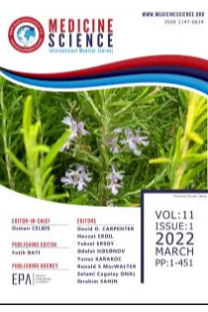Nutritional status and independence in daily life activities of individuals aged 65 or over during the COVID-19 Pandemic in Turkey
Nutritional status and independence in daily life activities of individuals aged 65 or over during the COVID-19 Pandemic in Turkey
___
- 1. World Health Organisation (WHO). Coronavirus 2020. Available from: https://www.who.int/data/ (Accessed 07.01.2021).
- 2. Li X, Geng M, Peng Y, et al. Molecular immune pathogenesis and diagnosis of COVID-19. J Pharmaceut Analysis 2020;10:102-08.
- 3. Niu S, Tian S, Lou J, et al. Clinical characteristics of older patients infected with COVID-19: a descriptive study. Arch Gerontol Geriat. 2020;89:104- 58.
- 4. Ali AM, Kunugi H. Approaches to nutritional screening in patients with coronavirus disease 2019 (COVID-19). Int J Environ Res Public Health. 2021;18:2772.
- 5. Silva DFO, Lima SCVC, Sena-Evangelista KCM. et al. Nutritional risk screening tools for older adults with COVID-19: a systematic review. Nutrients. 2020;12:2956-70.
- 6. Bencivenga L, Rengo G, Varricchi G. Elderly at time of coronavirus disease 2019 (COVID-19): possible role of immunosenescence and malnutrition. GeroScience. 2020;42:1089-92.
- 7. Azzolino D, Saporiti E, Proietti M, et al. Nutritional considerations in frail older patients with COVID-19. J Nutr Health Aging. 2020;24:1-3.
- 8. Ning H, Du Y, Ellis D. et al. Malnutrition and its associated factors among elderly Chinese with physical functional dependency. Public Health Nutrition. 2021;24:1404-14.
- 9. Silverio R, Gonçalves DC, Andrade MF, et al. Coronavirus disease 2019 (COVID-19) and nutritional status: the missing link? Adv Nutr. 2020; 00:1–11.
- 10. Donini LM, Stephan BCM, Rosano A, et al. What are the risk factors for malnutrition in older-aged ınstitutionalized adults? Nutrients. 2020;12: 2857-66.
- 11. Arik G, Dogan Varan H, Yavuz BB, et al. Validation of Katz Index of Independence in activities of daily living in Turkish older adults. Arch Gerontol Gerıat. 2015;61:344-50.
- 12. Maeda K, Koga T, Akagi J. Nutritional variables predict chances of returning home and activities of daily living in post-acute geriatric care. Clin Interv Aging. 2018;13:151-7.
- 13. Demir Akca AS, Saracli O, Emre U, et al. Relationship of cognitive functions with daily living activities, depression, anxiety and clinical variables in hospitalized elderly patients. Archives Neuropsych. 2014;51:267-74.
- 14. Guigoz Y, Vellas B, Garry PJ. Mini Nutritional Assessment: a practical assessment tool for grading the nutritional status of elderly patients. Facts Res Gerontol. 1994;4:12-13.
- 15. Sarikaya D, Halil M, Kuyumcu ME, et al. Mini nutritional assessment test long and short form are valid screening tools in Turkish older adults. Arch Gerontol Geriatr. 2015;61:56-60.
- 16. Katz S, Ford AB, Moskowitz RW, et al. Studies of illness in the aged. The Index of ADL: a standardized measure of biological and psychosocial function. JAMA. 1963;185:914-19.
- 17. Diker J, Etiler N, Yildiz M, et al. A ssociation between cognitive status and activities of daily living, life quality and some demographic variables in older than 65. Anatol J Psych. 2001;2:79-86.
- 18. Wafi AF, Susilo H, Nariswari AS. Nutritional status and functional status among elderly in Santo Yosef Surabaya Nursing Home. J Widya Medika Junior. 2019;1:137-45.
- 19. Muhamad AR, Hamirudin AH, Zainudin N, et al. Nutritional risk according to Mini Nutritional Assessment-short form among community dwelling elderly in Kuantan, Pahang: a pilot study. Inter J All Heal Sci. 2019;3:658- 67. [Internet]. Available from: https://journals.iium.edu.my/ijahs/index. php/IJAHS/article/view/188. Accessed: 15.05.2021.
- 20. Volkert D, Kiesswetter E, Cederholm T. et al. Development of a model on determinants of malnutrition in aged persons: A MaNuEL Project. Gerontol Geriatr Med. 2019;5:1-8.
- 21. Mattioli AV, Sciomer S, Cocchi C, et al. Quarantine during COVID-19 outbreak: changes in diet and physical activity increase the risk of cardiovascular disease. Nutr Metab Cardiovas. 2020;30:1409-17.
- 22. Li T, Zhang Y, Gong C, et al. Prevalence of malnutrition and analysis of related factors in elderly patients with COVID-19 in Wuhan, China. Eur J Clin Nutr. 2020;74: 871–5.
- 23. Carriedo A, Cecchini JA, Fernandez-Rio J, et al. COVID-19, psychological well-being and physical activity levels in older adults during the nationwide lockdown in Spain. Am J Geriatr Psychiatry. 2020;11:1146–55.
- 24. Woods JA, Hutchinson NT, Powers SK, et al. The COVID-19 pandemic and physical activity. Int Congr Ser. 2020;2:55-64.
- 25. Bahat G, Tufan F, Saka B, et al. Which body mass index (BMI) is better in the elderly for functional status? Arch Gerontol Geriat. 2012;54:78-81.
- 26. Wham CA, Teh RO, Robinson M, et al. What is associated with nutrition risk in very old age? J Nutr Health Aging. 2011;15:247-51.
- 27. Ulfiana E, Anggraini OR, Fauziningtyas R. How do I fulfill my nutrition: the experience of older adults who live alone. Indian J Pub Health Res & Devel. 2019;10:2724.
- ISSN: 2147-0634
- Yayın Aralığı: 4
- Başlangıç: 2012
- Yayıncı: Effect Publishing Agency ( EPA )
Tuba EKMEKYAPAR, Muhammed EKMEKYAPAR, Levent ŞAHİN, Omer Faruk SOLGUN, Şükrü GÜRBÜZ
Mursit Hasbek, Ayca Komurluoglu Tan
Oguzhan Bekir Egi̇lmez, Behice Han Almi̇s, Seyma Sehlikoglu
The comparison of telomere length in cancer patients: Plasma, whole blood and tumor tissue
Fatma Silan, Ozturk ÖZDEMİR, Furkan Erturk Urfali, Mine Urfali, Atila Gurgen
How technology addiction affects social anxiety in adolescent girls? A sample of Turkey's southeast
Behiye Di̇lmen Bayar, Funda Kavak Budak
Comparison of pupillometry measurements in myopic, emmetropic and hyperopic children
Cetin Akpolat, Alper Halil Bayat, Muhammed Mustafa Kurt
Mid-Term results of knee prosthesis infections
Deniz Ipek, Fatih Pestilci, Fatih Duygun, Ebru Kandırali Duygun, FIRAT SEYFETTINOGLU
